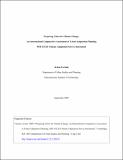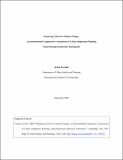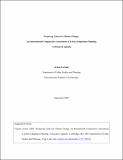Preparing Cities for Climate Change
Preparing Cities for Climate Change: An International Assessment of Urban Adaptation Planning
Cities throughout the world are noting shifts in weather and climatic patterns that they are attributing to climate change. As temperatures and precipitation change, many scientists argue that urban areas will need to cope with a host of impacts including increased incidence of heat waves, water shortages, storm surges, and floods. These impacts will stress urban infrastructure, decrease the habitability of many buildings, tax services, and, in the process, create housing, health and livelihood hardships for those who are most vulnerable.
Minimizing the impacts that climate change will have on cities and their inhabitants requires that urban municipalities make concerted efforts to protect natural systems, the built environment, and human populations. Mitigation refers to the development of policies that have the potential to reduce greenhouse gas emissions. In contrast, adaptation involves activities that decrease vulnerability and limit the effects of climate change.
Although the need for adaptation to climate impacts is pressing, there is notable variability emerging in the approaches that cities are taking to prepare for the impacts of climate change. Despite growing recognition of the need to understand preconditions for adaptation, and the importance of looking at preparedness in urban contexts, scholars have not investigated the forces and factors associated with variations in climate adaptation planning in cities. Therefore, this comparative international research addressed the following questions:
- What types of climate adaptation plans are being developed and adopted in cities and municipal departments?
- What explains differences in the approaches municipalities are taking toward climate adaptation planning?
- In what ways are the efforts of intergovernmental (IGO), nongovernmental (NGOs) and community-based organizations (CBOs) complementing, circumventing, and replacing government adaptation initiatives?
Case study and survey research (conducted between 2009 and 2014) were combined to address these questions. In addition, under the auspices of this project, a meeting of urban adaptation leaders was hosted at the Rockefeller Foundation Bellagio Study and Conference Center in 2011.
This project was developed and led by Professor JoAnn Carmin (1957-2014), of the Department of Urban Studies and Planning at MIT. It was funded by a grant from the Infrastructure Management and Extreme Events Program of the United States National Science Foundation and endorsed by the International Human Dimensions Programme's (IHDP) core project on Urbanization and Global Environmental Change (UGEC).
Recent Submissions
-
Preparing Cities for Climate Change: An International Comparative Assessment of Urban Adaptation Planning. MIT-ICLEI Climate Adaptation Survey Instrument
(2014-09-14)The research objective of this project is to conduct an international comparative assessment of urban adaptation planning. Cities throughout the world are experiencing chronic problems and extreme events that are being ... -
Preparing Cities for Climate Change: An International Comparative Assessment of Urban Adaptation Planning. Semi-Structured Interview Instrument
(2014-09-13)The research objective of this project is to conduct an international comparative assessment of urban adaptation planning. Cities throughout the world are experiencing chronic problems and extreme events that are being ... -
Preparing Cities for Climate Change: An International Comparative Assessment of Urban Adaptation Planning. A Research Agenda
(2014-09-13)The research objective of this project is to conduct an international comparative assessment of urban adaptation planning. Cities throughout the world are experiencing chronic problems and extreme events that are being ...


